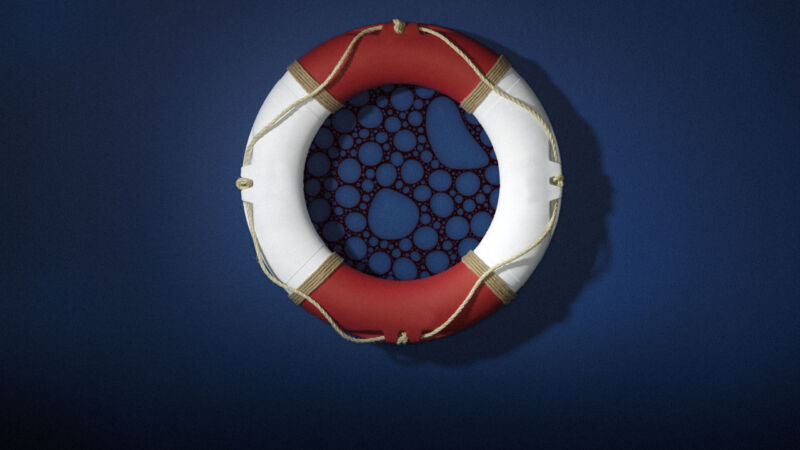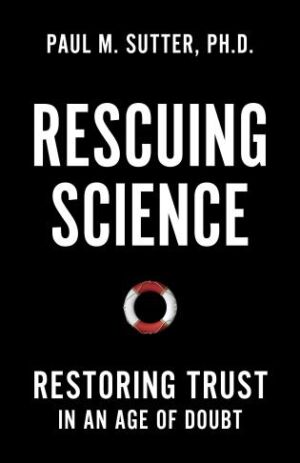
Rescuing Science: Restoring Trust in an Age of Doubt was the most difficult book I’ve ever written. I’m a cosmologist—I study the origins, structure, and evolution of the Universe. I love science. I live and breathe science. If science were a breakfast cereal, I’d eat it every morning. And at the height of the COVID-19 pandemic, I watched in alarm as public trust in science disintegrated.
But I don’t know how to change people’s minds. I don’t know how to convince someone to trust science again. So as I started writing my book, I flipped the question around: is there anything we can do to make the institution of science more worthy of trust?
The short answer is yes. The long answer takes an entire book. In the book, I explore several different sources of mistrust—the disincentives scientists face when they try to communicate with the public, the lack of long-term careers, the complicitness of scientists when their work is politicized, and much more—and offer proactive steps we can take to address these issues to rebuild trust.
The section below is taken from a chapter discussing the relentless pressure to publish that scientists face, and the corresponding explosion in fraud that this pressure creates. Fraud can take many forms, from the “hard fraud” of outright fabrication of data, to many kinds of “soft fraud” that include plagiarism, manipulation of data, and careful selection of methods to achieve a desired result. The more that fraud thrives, the more that the public loses trust in science. Addressing this requires a fundamental shift in the incentive and reward structures that scientists work in. A difficult task to be sure, but not an impossible one—and one that I firmly believe will be worth the effort.
Modern science is hard, complex, and built from many layers and many years of hard work. And modern science, almost everywhere, is based on computation. Save for a few (and I mean very few) die-hard theorists who insist on writing things down with pen and paper, there is almost an absolute guarantee that with any paper in any field of science that you could possibly read, a computer was involved in some step of the process.

Whether it’s studying bird droppings or the collisions of galaxies, modern-day science owes its very existence—and continued persistence—to the computer. From the laptop sitting on an unkempt desk to a giant machine that fills up a room, “S. Transistor” should be the coauthor on basically all three million journal articles published every year.
The sheer complexity of modern science, and its reliance on customized software, renders one of the frontline defenses against soft and hard fraud useless. That defense is peer review.
The practice of peer review was developed in a different era, when the arguments and analysis that led to a paper’s conclusion could be succinctly summarized within the paper itself. Want to know how the author arrived at that conclusion? The derivation would be right there. It was relatively easy to judge the “wrongness” of an article because you could follow the document from beginning to end, from start to finish, and have all the information you needed to evaluate it right there at your fingerprints.
That’s now largely impossible with the modern scientific enterprise so reliant on computers.
To makes matters worse, many of the software codes used in science are not publicly available. I’ll say this again because it’s kind of wild to even contemplate: there are millions of papers published every year that rely on computer software to make the results happen, and that software is not available for other scientists to scrutinize to see if it’s legit or not. We simply have to trust it, but the word “trust” is very near the bottom of the scientist’s priority list.
Why don’t scientists make their code available? It boils down to the same reason that scientists don’t do many things that would improve the process of science: there’s no incentive. In this case, you don’t get any h-index points for releasing your code on a website. You only get them for publishing papers.
This infinitely agitates me when I peer-review papers. How am I supposed to judge the correctness of an article if I can’t see the entire process? What’s the point of searching for fraud when the computer code that’s sitting behind the published result can be shaped and molded to give any result you want, and nobody will be the wiser?
I’m not even talking about intentional computer-based fraud here; this is even a problem for detecting basic mistakes. If you make a mistake in a paper, a referee or an editor can spot it. And science is better off for it. If you make a mistake in your code… who checks it? As long as the results look correct, you’ll go ahead and publish it and the peer reviewer will go ahead and accept it. And science is worse off for it.
Science is getting more complex over time and is becoming increasingly reliant on software code to keep the engine going. This makes fraud of both the hard and soft varieties easier to accomplish. From mistakes that you pass over because you’re going too fast, to using sophisticated tools that you barely understand but use to get the result that you wanted, to just totally faking it, science is becoming increasingly wrong.
https://arstechnica.com/?p=2030357

